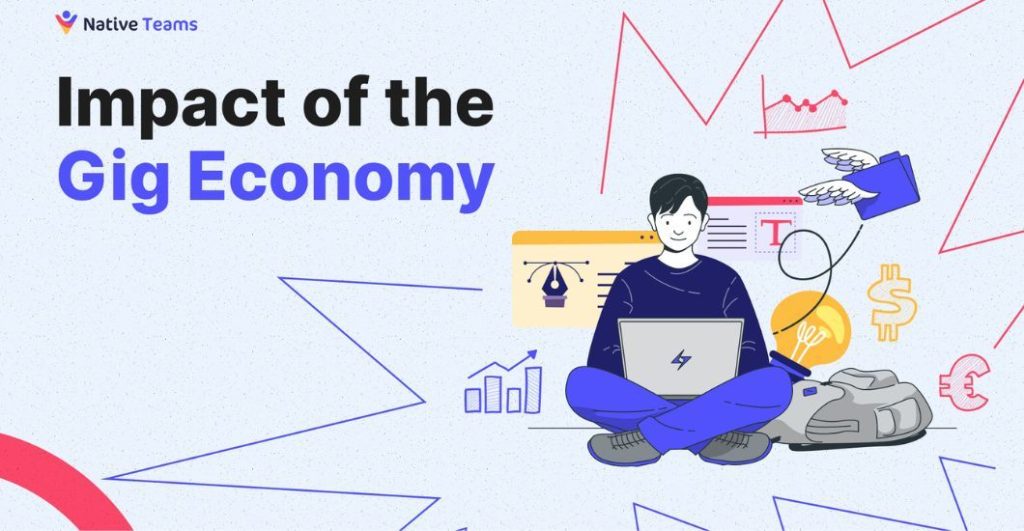The gig economy has emerged as a defining feature of the modern labor market, fundamentally transforming how businesses operate and how workers engage with employment opportunities. Characterized by short-term contracts, freelance work, and on-demand services, the gig economy challenges traditional employment models and introduces new dynamics for companies seeking flexibility and cost efficiency. As more individuals opt for gig work and organizations adapt to this shifting landscape, the business impact of the gig economy becomes increasingly significant and complex.
At its core, the gig economy offers businesses a way to access a flexible workforce that can be scaled up or down depending on demand. This flexibility allows companies to reduce overhead costs associated with full-time employees, such as benefits, office space, and long-term commitments. Particularly for startups and small enterprises, the ability to engage specialized talent on a project-by-project basis opens doors to expertise that might otherwise be financially out of reach. Even large corporations are leveraging gig workers for tasks ranging from creative projects to IT support, demonstrating the model’s broad applicability.
For workers, the gig economy provides an appealing alternative to traditional employment, offering greater autonomy, varied work experiences, and the potential for better work-life balance. Many gig workers appreciate the freedom to choose when, where, and how much they work. However, this shift also raises questions about job security, income stability, and access to benefits such as healthcare and retirement plans. As a result, the gig economy is redefining not only how businesses manage labor but also how workers perceive and negotiate their professional identities.
From a business perspective, one of the most profound impacts of the gig economy is the acceleration of innovation and responsiveness. Companies can quickly assemble teams with diverse skills tailored to specific projects, enabling rapid product development and agile responses to market changes. This model also encourages a more entrepreneurial mindset within organizations, as workers bring fresh ideas and specialized knowledge without the constraints of traditional hierarchies. The gig economy fosters a culture of collaboration and continuous learning, which can be a significant competitive advantage in today’s fast-paced markets.
Yet, the gig economy presents notable challenges for businesses, particularly around managing quality, consistency, and compliance. With a workforce that is often dispersed and temporary, maintaining strong communication and alignment with company goals can be difficult. Ensuring that gig workers meet the expected standards requires robust onboarding processes and ongoing oversight. Additionally, legal and regulatory issues are evolving as governments seek to balance the benefits of gig work with protections for workers. Companies must navigate complex employment laws and tax obligations, which vary across jurisdictions and can add layers of administrative complexity.
The impact of the gig economy also extends to corporate culture and employee engagement. Integrating gig workers into the broader organizational ecosystem without creating divisions between full-time staff and contractors is a delicate task. Companies must foster inclusivity and recognize the contributions of gig workers to maintain morale and loyalty. Innovative communication tools and digital platforms have become essential in bridging the physical and psychological gaps between different types of workers, supporting collaboration and a shared sense of purpose.
Looking ahead, the gig economy’s influence on business is likely to deepen as technological advancements continue to facilitate remote work and digital marketplaces. Platforms that connect freelancers with clients are becoming more sophisticated, incorporating AI-driven matching and payment systems that streamline transactions and improve reliability. Moreover, the rise of remote work has expanded the talent pool globally, enabling businesses to tap into diverse skill sets regardless of geography. This globalization of gig work introduces new opportunities but also amplifies challenges related to cultural differences, time zones, and legal compliance.
As the gig economy matures, companies that embrace its principles while addressing its inherent risks stand to benefit the most. Strategic integration of gig workers can enhance organizational agility, reduce costs, and foster innovation. However, businesses must also develop frameworks for fair compensation, clear expectations, and supportive environments to ensure that gig workers feel valued and motivated. Balancing flexibility with responsibility is key to harnessing the full potential of the gig economy in a sustainable manner.
In conclusion, the gig economy is reshaping the business landscape by redefining labor relationships, operational strategies, and organizational culture. Its rise reflects broader societal trends toward flexibility, technology-driven work, and individual empowerment. For businesses willing to adapt, the gig economy offers a powerful model to meet the demands of a dynamic market while accessing a rich pool of talent. At the same time, thoughtful management and ethical considerations are essential to create a balanced ecosystem where both companies and gig workers can thrive in the long term.



